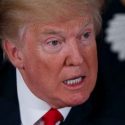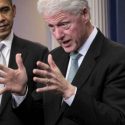Our trade deficit puts us on the brink of another financial crisis
Peter Morici,
The deficit on international trade goods and services in March was about $43.7 billion, the Commerce Department reported, indicating the United States is on track to have a trade gap of more than $500 billion again this year.
The trade deficit has been a source of torment for decades. Critics blame it for job losses. Apologists say it permits Americans to consume more and cheaper products without much harm.
Both arguments have an element of truth — but most importantly, the trade deficit must be financed. Foreign governments and private individuals buy U.S. Treasuries, corporate stocks and bonds and real estate in tony locations like Manhattan and Miami Beach, and every year they must pay increasing interest, dividends and rent on those assets.
Americans make similar investments abroad, but overall, foreigners are buying more here. The U.S. Net International Investment Position (NIIP) is now minus 45 percent of GDP, and if large trade deficits persist, it could reach negative 60 percent over the next decade — likely sooner. In recent years[SB2] , no nation has reached that level of indebtedness without eventually going through a reversal of its trade deficit, often accompanied by a financial crisis or severe domestic deflation.
Economists are inclined to believe bilateral deficits — or even deficits in particular commodities like oil — don’t matter. But if one country or commodity is huge in the numbers, then the global problem can’t be addressed without addressing the particular country or commodity.
China accounts for more than 60 percent of the U.S. trade deficit, and petroleum accounts for more than a quarter of the rest.
The Trump administration proposes to fix this by pressuring China to open its markets — if Americans can sell more in China, then we can continue to enjoy cheap consumer goods at Wal-Mart — and by liberating the oil and gas sector from Obama-era regulations and continuing to build out wind, solar and other renewable energy sources.
As for China, President Trump’s recent statement on trade policy indicates revved-up use of trade remedy laws to keep out or at least penalize subsidized and dumped imports. For U.S. industries that benefit, hooray! But Beijing advantages domestic producers in so many ways — from forced technology transfers from foreign investors to generous benefits for technology startups — that the president’s strategy reminds me of the farmer chasing an infestation of grasshoppers with a butterfly net.
The Peterson Institute, in a forthcoming study, suggests a program of currency market intervention to offset foreign government intervention in currency markets and to lower the value of the dollar across the board. These days, manipulation by foreign governments is not the problem. It’s the lack of confidence in the durability of existing regimes. French presidential candidate Marine Le Pen’s challenges to the future of the EU and China’s authoritarian regime are scaring investors and driving down the euro and yuan.
At their Mar-a-Lago Summit last month, Trump and Chinese President Xi Jinping announced a 100-day review of policies to address the trade deficit, but that is as unlikely to yield results as were similar bilateral talks initiated by Presidents George W. Bush and Barack Obama.
Warren Buffet, for many years, has suggested a system of import certificates, and I have advocated a tax on the conversion of currency into yuan. The latter would essentially raise the price of imported goods and encourage reshoring.
Under the Buffet Plan, exporters would receive certificates to import goods in amounts equal to their foreign sales, and those, in turn, could be sold to importers who would be required to present certificates to bring goods and services into the country. Those certificates would go to the highest bidders, and hence they’d be used to import goods that had the highest value to consumers.
Rather than apply it to all our trading partners, which would cause global outrage, I would apply it only to trade with China — and endure its bellicosity. If Beijing won’t realign its economy to rely less on trade surpluses with the United States, this scheme will do it for them.
Peter Morici served as Chief Economist at the U.S. International Trade Commission from 1993 to 1995. He is an economist and professor at the Smith School of Business, University of Maryland.





